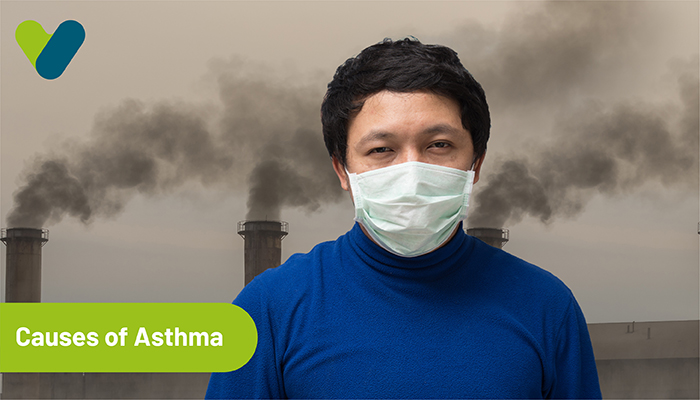The lungs comprise small airways and air sacs that facilitate easy exchange of oxygen and carbon dioxide. Certain factors can cause these airways to get narrowed and inflamed. This condition is called Asthma. Asthma is thus a pulmonary or respiratory disease predominantly characterised by breathing complications. Asthma is caused by several different factors ranging from congenial defects to allergies. As such, it is difficult to pinpoint a single direct cause of asthma. Moreover, the illness can be detected at any stage in human life, including childhood, adolescence and adulthood. Asthmatic patients typically experience symptoms like shortness of breath, chest tightness, chronic coughing and wheezing. Since there's no known cure available, asthma treatment involves alleviating the symptoms and tentatively widening the narrowed airways.
What Happens To The Body When You Have Asthma
Asthma is a long-term chronic pulmonary disease that causes the narrowing, and subsequent inflammation of the airways. The primary function of the airways is to supply air into the alveoli. Here, oxygen is absorbed into the blood and carbon dioxide is released. If the lining of the airways swell, air cannot pass through them effectively. Shortage of air means shortage of oxygen. This can cause chronic cough and breath shortness. Pale skin, headaches, blue lips and fingernails, etc. are other prominent symptoms of asthma.
Causes Of Asthma
Researchers are yet to discover what causes asthma in adults and children. The following are the known factors responsible for the development of asthma:- Family History Your family history is one of the strongest influences on your risk of developing asthma. Asthma runs in the family the way blue eyes, curly hair or athletic abilities do. You are more likely to get asthma if a parent or sibling also has asthma. The risk amplifies if more than one close relative has asthma.
- Respiratory Infections During Childhood The inherent immunity in children diminishes within a few months after birth. They need to build immunity through vaccination or by getting naturally infected. Children also have low lung recoil and weak respiratory muscles. A respiratory infection developed early on in life can induce symptoms of asthma. These symptoms may develop into severe asthma as children grow.
- Allergies Asthma is caused due to allergies as well. The immune system creates antibodies to fight foreign, usually harmless, substances. These antibodies cause allergy symptoms like skin reactions, runny nose, nasal congestion, watery eyes, etc. Allergies can also affect the lungs and airways. Thus, if you have allergies that frequently aggravate the airways like rhinitis or even eczema, the risk of asthma is high.
- Smoking The airway lining is made up of hair-like structures called cilia. Their role is to sweep dust and mucus out of the airways. When you smoke tobacco, the smoke particles deposit on the cilia, which can no longer sweep out dust and mucus effectively. This leads to excess mucus production and blocking of the airways. Asthma is caused due to second-hand or passive smoke inhalation. Smoking is also a common reason for what causes asthma in adults.
- Urbanisation Urbanisation leads to copious amounts of carbon emissions. Emissions can be from fuel-powered vehicles, industries, household appliances, etc. If you live in a city, you are more likely to develop asthma. In this case, your exposure to pollutants is relatively greater. When pollutants enter the body, the airway epithelium goes into defence mode. It fends off the pollutant particles by producing excess mucus, consequently blocking the airways.
- Obesity Obesity is major risk factor for asthma. Increased adipose (fat) tissue is often followed by asthma. In children, such asthma is caused by maternal obesity and weight gain during pregnancy. Excessive fat in the thoracic and abdominal cavities can compress the lungs. A reduced lung volume can contribute to a collapsed airway.
- Occupational Hazards Many individuals develop asthma as adults. Exposure to occupational hazards like industrial chemicals, fumes, vapours, dust, mould, etc., can cause adult-onset asthma and occupational asthma. The airways become irritated and inflamed. Chemicals like chlorine found in cleaning products and pesticides are also instant triggers of asthma.
- Hygiene Hypothesis Hygiene hypothesis states that an extremely clean environment may fail to expose children to the necessary germs required to build immunity. Such environments fail to build the body's defence response. An inadequate defence response may greatly contribute to asthma development.
- Hormones There's a gender disparity in asthma. Fluctuations in hormones during menstruation and pregnancy are associated with asthma symptoms. Hormones like oestrogen and androgen may also regulate airway inflammation, airway hyperreactivity and mucus production. The cause for the same remains unknown. Furthermore, hormonal changes during pregnancy can make the existing symptoms worse.
